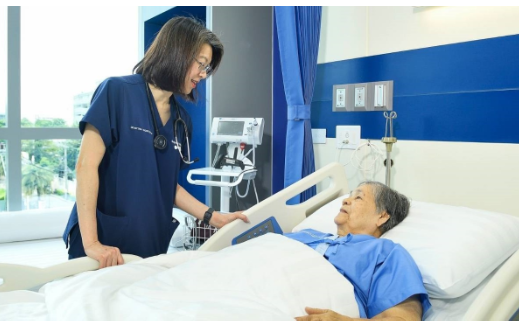Introduction
Nerve pain, otherwise called neuropathic pain, can be a very unpleasant – and even life-altering – condition. The spine — the central highway of the nervous system — is one of the most frequent sources of this variety of pain. At Sapiens Pain Hospital, we see many patients searching for relief from nerve pain; in many cases, stemming from a back-related source and it is important to recognize the underlying medical explanations in order to achieve relief.
An Insight Into the Relationship Between the Spine and Nerve Pain
The backbone of the human body (or the spine) is an intricate system of the vertebrae, intervertebral disks, ligaments, muscles and medulla spinalis. It not only supports the structure that makes you stand up straight, but it also serves to protect the spinal cord — an avenue of communication between the brain and the body. If any aspect of this system is compromised, nerve roots can be pinched, pressed upon or inflamed, leading to sudden, severe or radiating pain.
Sapiens Pain Hospital has dealt with thousands of cases where they experience numbness, tingling or burning sensations in some location of their bodies, which can be traced to the spinal roots. Here, we take a look at the leading medical causes behind its occurrence.
- Herniated or Bulging Discs
One major source of nerve pain that starts in the back is a herniated or bulging disc. Discs act as a cushion between the vertebrae, enabling smooth movement and absorbing impact. But when a disc slips, or bulges, pain results from pressure on nerves.
Typical symptoms include pain that radiates down the legs (sciatica) or arms, depending on the location of the disc. At Sapiens Pain Hospital, we use cutting-edge imaging diagnostics to help determine the precise location and severity of your disc-related problems, which will help you benefit from interventions like physical therapy, medication, or minimally invasive surgeries.
- Spinal Stenosis
Stenosis (narrowing) of the spinal canal may cause the spinal cord or nerve roots to be compressed. It is commonly seen in the elderly, and senile or degenerative changes of the spine is also a factor. Patients often suffer from lower back or leg pain, or from neck or arm pain, generally during walking or prolonged standing.
Experts at Sapiens Pain Hospital use conservative management techniques in treating low back pain such as postural corrections, strengthening exercises and injection. Surgical decompression may be required in severe cases.
- Degenerative Disc Disease
Degenerative Disc Disease (DDD) describes the loss of hydration and elasticity of the discs between the vertebrae, resulting in a lack of efficiency as shock absorbers. As the discs wear out, nerve roots can be irritated or pinched, causing chronic pain that may shoot from the back and down the legs or the arms and the hands.
Although DDD is also a result of normal aging, it can have a large impact on Q OL. At Sapiens Pain Hospital we offer customized treatment plans that include regenerative medicine, spinal injections, and lifestyle counseling that help to reduce pain symptoms without surgery.
- Sciatica
Sciatica is not a diagnosis but a symptom of an underlying problem, most typically compression of the sciatic nerve — the longest and widest nerve in the body. It is often due to disc herniation, spinal stenosis or spondylolisthesis. The pain typically spreads from the lower back to the buttocks and runs down the back of the legs.
At the Sapiens Pain Hospital you can find relief from sciatica using a non surgical combination of treatments, such as physical therapy, spinal manipulations and nerve blocks for pain and function restoration.
- Spondylolisthesis
Spondylolisthesis is the displacement of one vertebra, which slips and pinches a nerve. This may be from birth defects, injury, or age-related wear and tear. In the lower back, depending on the severity, it can cause a cycle of nerve root compression leading to back pain, leg weakness, or numbness.
Diagnosis and treatment at Sapiens Pain Hospital may include bracing, selective strengthening exercises or surgical stabilization for returning to normal stability when non-surgical techniques are ineffective.
- Infections and Inflammatory Conditions
Some conditions, such as ankylosing spondylitis or spinal infections, may cause the spinal joints to become inflamed and to press on nearby nerves. These response to inflammation are frequently characterized by stiffness, prolonged pain and decreased flexibility of the spine.
At Sapiens Pain Hospital, a united medical approach to solve the inflammatory source and settled nerve pain applying the joint effort of rheumatology care, focused pain therapy and far-stretched rehabilitation programs.
Why Diagnosis and Specialized Care Is Important
Spinal-related nerve pain is complicated and easy to misdiagnose, so it is critical to seek specialized care. Sapiens Pain Hospital is internationally recognized for its multidisciplinary care with a belief in both pin-point accuracy diagnostics, pin-point accuracy in interventional procedures, & holistic management of pain. From electrodiagnostics to state-of-the-art imaging, patients are provided with a detailed evaluation and individualized treatment depending on the diagnosis.
Conclusion
Nerve pain from the spine is a result of structural or inflammatory changes in the back that can compress or irritate nerve roots. Herniated discs, spinal stenosis, and degenerative disc disease are a few of the most notorious offenders. Timely diagnosis and treatment is important for successful relief.
At Sapiens Pain Hospital, patients enjoy world-class professionals, state-of-the-art technology, and superior attention focused on a fast, smooth recovery. If you or someone you love is suffering from nerve pain related to spinal conditions, don’t wait — count on the expertise of the professionals at Sapiens Pain Hospital to help you get your comfort and your quality of life back.




